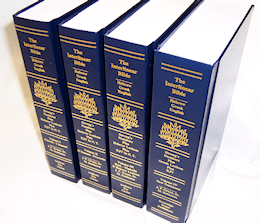Textus Receptus Bibles
Jay P. Green's Literal Translation 1993
| 13:1 | It was one year since Saul became king, then he reigned two more years over Israel. |
| 13:2 | And Saul chose for himself three thousand out of Israel. And two thousand were with Saul in Michmash, and in the hills of Bethel. And a thousand were with Jonathan in Gibeah of Benjamin. And he sent the rest of the people each to his tent. |
| 13:3 | And Jonathan struck the fort of the Philistines in Geba. And the Philistines heard. And Saul blew with the ram's horn throughout all the land, saying, Let the Hebrews hear. |
| 13:4 | And all Israel heard, saying, Saul has struck a fort of the Philistines; and also Israel has made himself stink to the Philistines. And all the people were called after Saul, to Gilgal. |
| 13:5 | And the Philistines gathered to fight with Israel, with thirty thousand chariots and six thousand horsemen, and people as the sand which is on the lip of the sea for multitude. And they came up and pitched in Michmash, east of Beth-aven. |
| 13:6 | And the men of Israel saw that they were in a strait, for the people were distressed. And the people hid themselves in caves, and in crevices, and in crags, and in tombs, and in cisterns. |
| 13:7 | And the Hebrews crossed over the Jordan to the land of Gad and Gilead. And Saul was still in Gilgal. And all the people followed him, trembling. |
| 13:8 | And he waited seven days, according to the set time with Samuel. But Samuel had not come to Gilgal; and the people were scattered from him. |
| 13:9 | And Saul said, Bring near to me the burnt offering and the peace offerings. And he offered up the burnt offering. |
| 13:10 | And it happened, as soon as he finished the burnt offering, behold, Samuel came. And Saul went out to meet him, and to bless him. |
| 13:11 | And Saul said, Because I saw that the people were scattering from me, and you did not come in the days set out, and the Philistines were gathering at Michmash, |
| 13:12 | then I said, Now the Philistines will come down to me to Gilgal, and I have not sweetened the face of Jehovah; and I forced myself, and offered a burnt offering. |
| 13:13 | And Samuel said to Saul, You have acted foolishly that you have not kept the command of Jehovah your God which He commanded you. For now Jehovah would have established your kingdom over Israel forever. |
| 13:14 | But now your kingdom shall not stand. Jehovah has sought out for Himself a man according to His own heart, and Jehovah has appointed him as leader over His people. For you have not kept that which Jehovah commanded you. |
| 13:15 | And Samuel rose up and went up from Gilgal to Gibeah of Benjamin. And Saul numbered the people who were found with him, about six hundred men. |
| 13:16 | And Saul and his son Jonathan, and the people who were found with them, were staying in Gibeah of Benjamin; and the Philistines pitched in Michmash. |
| 13:17 | And the spoilers came out of the Philistine camp in three companies; one company turned to the way to Ophrah, to the land of Shual; |
| 13:18 | And another company turned the way to Beth-horon; and another company turned to the way of the border looking down on the valley of Zeboim toward the wilderness. |
| 13:19 | And there was no smith found throughout all the land of Israel, for the Philistines said, Lest the Hebrews make swords or spears. |
| 13:20 | And all Israel went down to the Philistines, each man to sharpen his plowshare, and his mattock, and his axe, and his plowshare. |
| 13:21 | And the sharpening charge was a pim for the plowshares, and for the mattocks, and for the three pronged forks, and for the axes, and for setting the plowshares. |
| 13:22 | And it happened in the day of battle that there was neither sword nor spear in the hand of any of the people with Saul and Jonathan. But one was found with Saul and with his son Jonathan. |
| 13:23 | And the fort of the Philistines went out to the pass of Michmash. |

Green's Literal Translation 1993
Green's Literal Translation (Literal Translation of the Holy Bible - LITV), is a translation of the Bible by Jay P. Green, Sr., first published in 1985. The LITV takes a literal, formal equivalence approach to translation. The Masoretic Text is used as the Hebrew basis for the Old Testament, and the Textus Receptus is used as the Greek basis for the New Testament.
Green's Literal Translation (LITV). Copyright 1993
by Jay P. Green Sr.
All rights reserved. Jay P. Green Sr.,
Lafayette, IN. U.S.A. 47903.